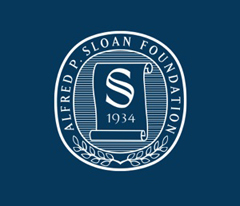Alfred P. Sloan Foundation
If Data Sharing is the Answer, What is the Question?
Award# 2015-14001
July 2015-June 2020
Christine L. Borgman, UCLA, Principal Investigator
Joshua Greenberg, Sloan Program Director
Digital Information Technology Program, Alfred P. Sloan Foundation
Advisory Board
George Djorgovski, Caltech University
Alyssa Goodman, Harvard University
Carl Kesselman, USC Information Sciences Institute
Marilyn Raphael, UCLA
Alexander Szalay, Johns Hopkins University
Data sharing has become policy enforced by governments, funding agencies, journals, and other stakeholders. Yet data sharing and reuse are common practice in only a few fields. The lack of success of data sharing policies, despite accelerating enforcement over the last decade, indicates the need not just for a much deeper understanding of the roles of data in contemporary science, but also for developing new models of scientific practice. This three-year project is studying data practices, policy, and infrastructure of four distributed scientific collaborations, exploring methods of data collection and management, innovations in scaling and workflows, and multidisciplinary approaches to complex problems. Our driving question addresses how, why, and when scientific teams mobilize data to create, extract, or protect value, and how they distribute investments, risks, and responsibilities for data. Our explanatory findings will inform scientific practice, policy, infrastructure, and workforce requirements within and between domains. Stakeholders in this research include scientists, technologists, universities, librarians, archivists, publishers, funding agencies, policy makers, and the public at large.
Alfred P. Sloan Foundation
The Transformation of Knowledge, Culture, and Practice in Data-Driven Science:
A Knowledge Infrastructures Perspective
Award# 2011-3194
January 2012-December 2015
Christine L. Borgman, UCLA, Principal Investigator
Sharon Traweek, UCLA, Co-Principal Investigator
Joshua Greenberg, Sloan Program Director
Digital Information Technology Program, Alfred P. Sloan Foundation
Advisory Board
George Djorgovski, Caltech University
Alyssa Goodman, Harvard University
Alexander Szalay, Johns Hopkins University
The goal of this project is to guide investments in infrastructures, tools, and environments for data-driven science and to inform design and policy for data management. We employ a 2 x 2 design, comparing projects that produce large volumes of homogeneous data vs. smaller amounts of heterogeneous data (the long tail of science), and comparing projects at earlier and later stages of their life cycles. Comparisons of these four distributed research collaborations enable us to assess the knowledge infrastructure requirements for a broad spectrum of scientific research and practice. They also enable us to assess knowledge transfer between scientists, between scientists and information professionals, between research projects, and between science projects and the public. We have identified infrastructure practices that contribute to good, better, best, weak, and poor strategies for data management, and are making recommendations for policy and practice to multiple stakeholders. No study of data practices and policy has been attempted at this scale. While large studies of science infrastructure and science practice have been conducted, prior studies of data practice and use, including ours, have been much more limited in number of research subjects, in number of sites, and in time frame.
For more information, please see our 2011 Alfred P. Sloan Foundation funding announcement in UCLA Today or consult the UCLA Press Release.
National Science Foundation: S2I2
Conceptualizing an Institute for Empowering Long Tail Research, Award # 1216872
October 2012-September 2013
Christine Borgman, University of California Los Angeles
Ian Foster, University of Chicago
Bryan Heidorn, University of Arizona
Bill Howe, University of Washington
Carl Kesselman, University of Southern California
Irene M. Qualters, NSF Program Officer
This S2I2 Conceptualization project aims to determine whether these obstacles to discovery and innovation can be overcome via the use of software as a service (SaaS) methods. Such methods have proven immensely effective for small and medium businesses due to their ability to deliver advanced capabilities while streamlining the user experience and achieving economies of scale. To determine whether similar benefits can apply for SMLs, the project team will engage with multiple science communities to identify science practices, match science practices against candidate SaaS offerings, and evaluate business models that could permit sustainable development of those offerings.
National Science Foundation: EAGER
EAGER: Knowledge and Data Transfer: the Formation of a New Workforce, Award# 1145888
September 2011-August 2013
Christine L. Borgman, UCLA, Principal Investigator
Sharon Traweek, UCLA, Co-Principal Investigator
Mimi McClure, NSF Program Officer
Bob Chadduck, NSF Program Officer
This is an EAGER proposal to support 2 graduate students in research which responds to an immediate need concerning critical questions focused on transferring, managing, and the organizational issues of large digital datasets. The basis of the project capitalizes on a very important event: The Sloan Digital Sky Survey (SDSS) scientific dataset is being transferred from one repository to two others, from a national laboratory to a university library and also to a university-based group of astronomers – from one kind of workforce to two others. This is a pivotal moment to study in the organization of digital knowledge in astronomy and how that knowledge will be developed.
The transfer of the database between the three workforces, although highly planned, will face multiple strategic difficulties that will require members of all workforces to develop a new form of knowledge at the interface of their different practices. Those who become adept at this interface of knowledge and data transfer will possess knowledge crucial to the designers of data repositories and those who make use of them. Understanding changes, organizational structures, identifying differences and managing cultural and technical issues can be extremely informative to proposed approaches in the cross-disciplinary/cross-workforce science of the future.
National Science Foundation
The Data Conservancy
(A Digital Research and Curation Virtual Organization), Award# 0830976
August 2009-July 2012
Sayeed Choudhury, Johns Hopkins University, Principal Investigator
Mimi McClure & Irene Lombardo, NSF Program Officers
UCLA Sub-project on astronomy data practices:
Christine L. Borgman, UCLA, Principal Investigator
Sharon Traweek, UCLA, Co-Principal Investigator
The Data Conservancy begins with data spanning anthropology, applied mathematics, astronomy, atmospheric sciences, chemistry, earth sciences, crop and soil sciences, ornithology, psychology, physics, theoretical and applied mechanics. International partnerships augment this initial collection. Evolutionary development of this collection will be guided by the user centered design process.


